Features of tomato trellis
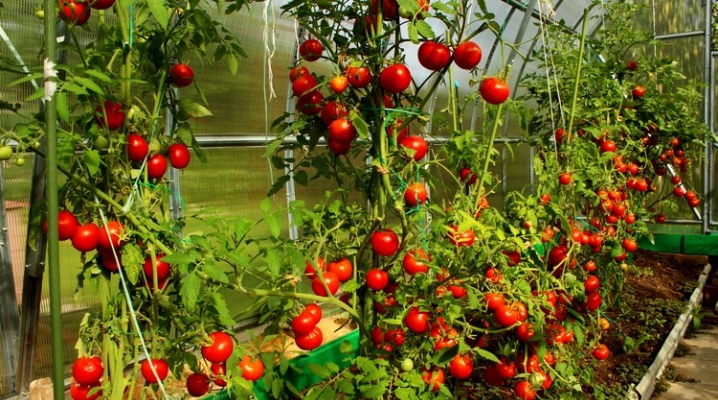
For comfortable ripening of tomatoes, they must be tied up. For this, special devices are used - trellises. What are their features, how to make a garter with your own hands, we will analyze in this article.
Appointment
Of all varieties of tomatoes, tall and medium-sized species need tying. because they carry a large weight of the crop, which can lead to damage and death of the plant.
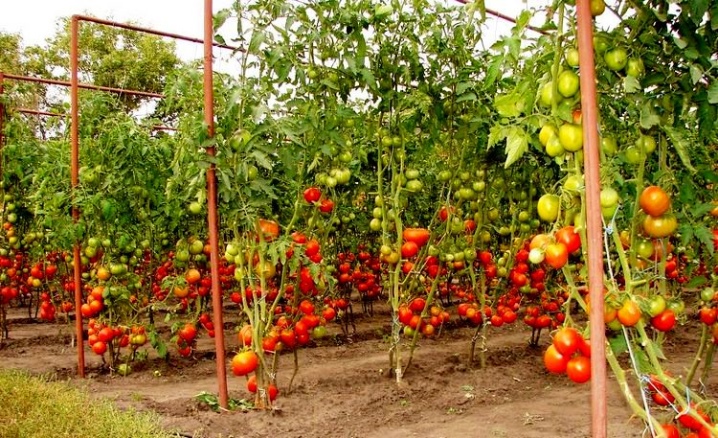
What else are tomato trellises needed for:
- due to close contact with the ground, snails and fungal infections can start on tomatoes, and trellises will help prevent this;
- the structure transfers the center of gravity of the plant load to itself;
- the harvest will ripen faster, since the sun's rays have the opportunity to better penetrate the plant;
- with such a device it is easier to harvest.
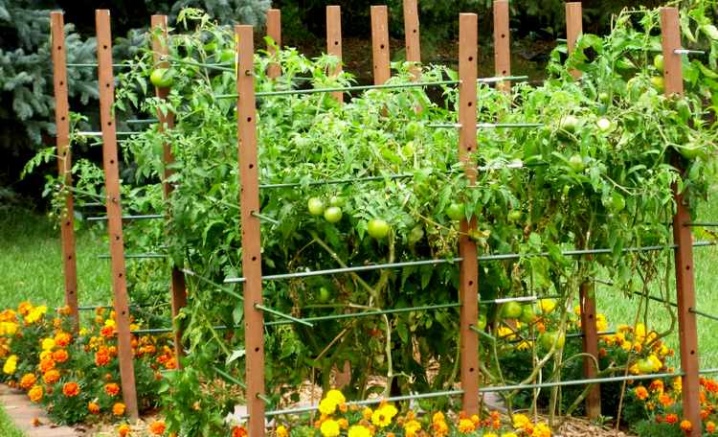
Description of species
Gardeners use several methods of tying tomatoes. Each of them has its own characteristics, and they are all popular.
Vertical
Best suited for garters of tall tomato varieties. This design will help the stems to endure even the most bountiful harvest. The point is that one side of the rope should be tied to the plants, and the other should be attached to the top of the greenhouse. This will save space and prevent your plants from getting damaged.
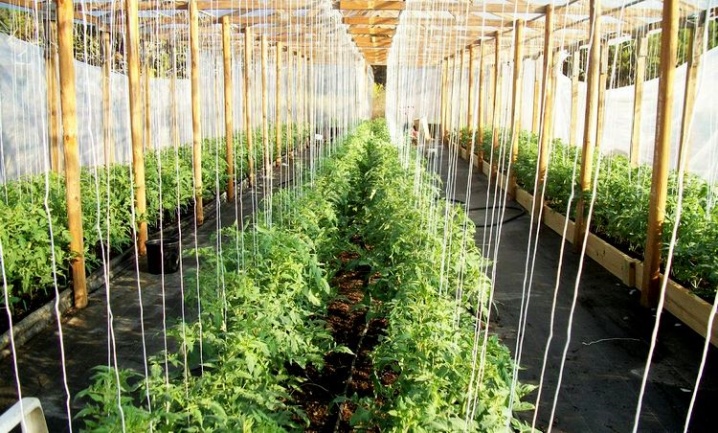
Horizontal
This method is used if the plants are growing in a fairly large greenhouse. It will make it easy to place spreading bushes. This will allow the tomatoes to be tied up as they grow. The scheme for creating such a structure is quite simple. It differs in that the rope must be pulled between the stakes.
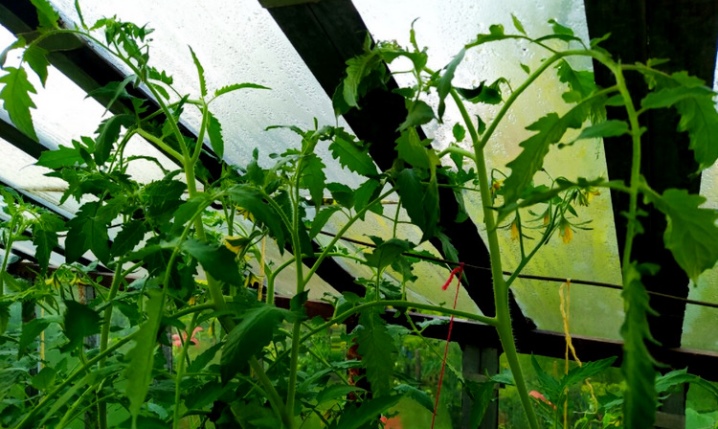
Mesh mount
This method combines two components. A mesh of metal or plastic is stretched between the supports, allowing you to place fruitful and tall plants. The bushes are tied with twine, making the fastening more durable. The advantages of this method include the fact that with an increase in the size of the bush, it becomes possible to attach it to a higher level. In this case, you do not need to drive stakes into the ground for all plants.
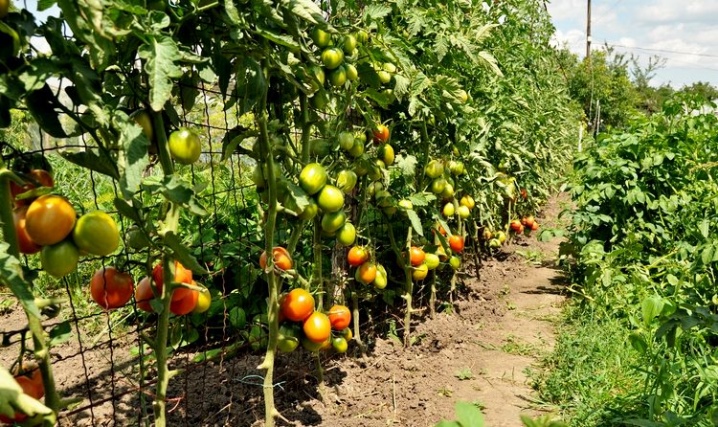
Other
There are several different types of frames that can be used to support tomatoes. The most popular are prism and cone. They are made from wood or metal and are perfect for plants with large fruits. The pluses include the fact that such a structure can be easily moved to another place. On the downside, there may be difficulties in harvesting.
Another way is the well-known pegs. This type of fastening is suitable only for medium-sized bushes, because when working with tall plants there is a risk that the fastener will not withstand and break.
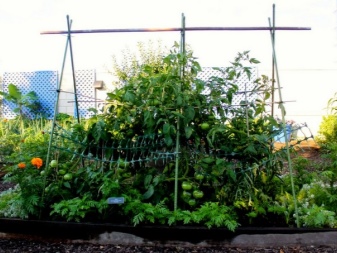
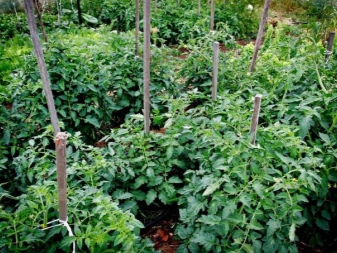
Harvest in this case is not worth waiting for. This method works according to the principle: one bush - one support. The height of the peg should be higher than the height of the plants, this is the only way to ensure a comfortable harvest.
Materials (edit)
Tying tomatoes in open and closed ground is slightly different. For to tie up plants in a polycarbonate greenhouse, you need to decide on the necessary equipment. Most often, metal posts and rope are used. And you can also fix the plants with plastic clips.
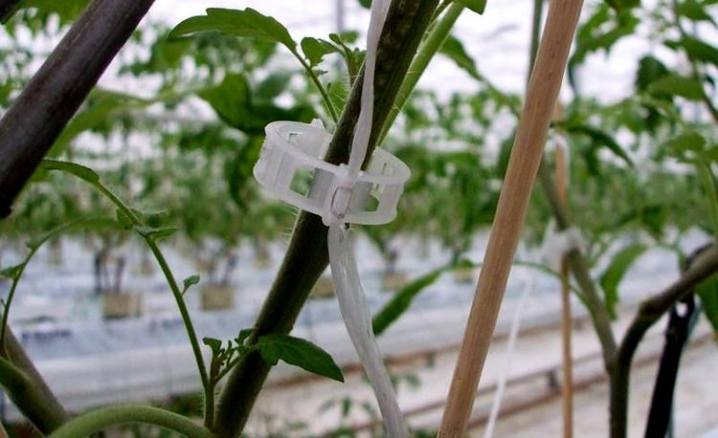
If you are planning a vertical method of fastening, you need to stock up on a rope with which the plants will be tied and attached to the ceiling of the greenhouse.... However, it is worth considering carefully when choosing a suitable rope. It should be soft, wide and strong so as not to damage the bushes.
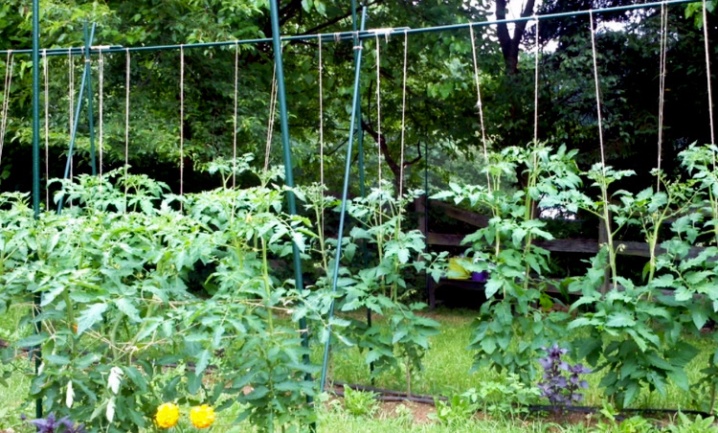
For small greenhouses, a tomato garter to an individual support is suitable. Materials are needed for fabric and wooden stakes. They can be replaced with pipes made of metal or plastic.
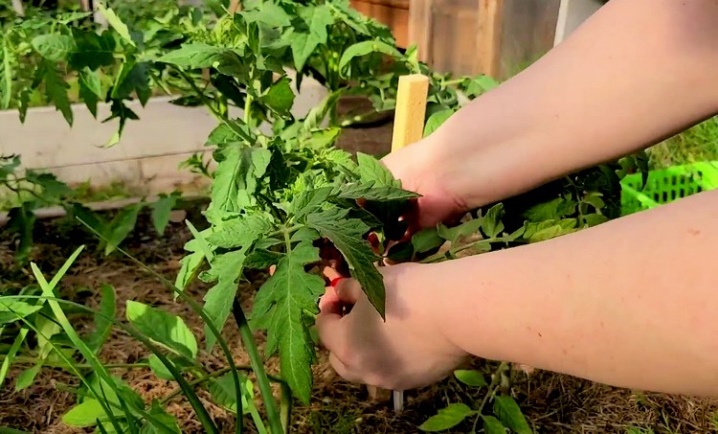
How to do it yourself?
The ideal support will be the manufacture of a cylinder from a mesh with large meshes. It is recommended to dig a little deeper around each tomato bush outdoors than in a greenhouse. This will make the structure more robust and practical. Despite the fact that creating a wire frame for each plant is an expensive and time-consuming process, and it will be more difficult to collect fruits from the bushes, this method should be preferred to residents of those places where strong and gusty winds prevail.
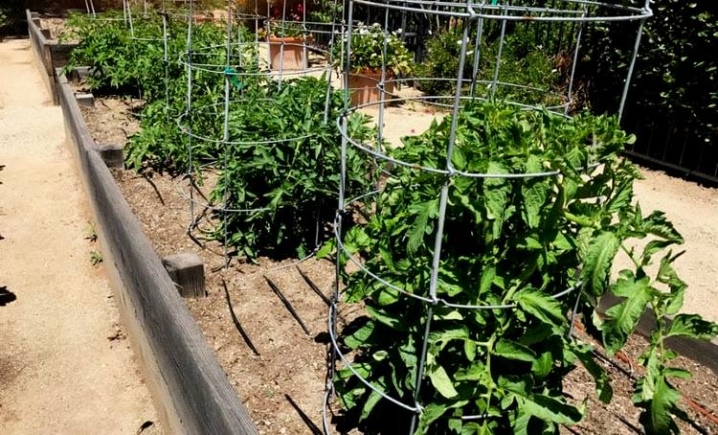
When tying outdoors, it is important to remember not to use fabric as it has been proven to rot due to rain and can carry pathogenic bacteria. Consider options for garter tomatoes with your own hands.
- Pegs. Everyone's favorite and easiest way.
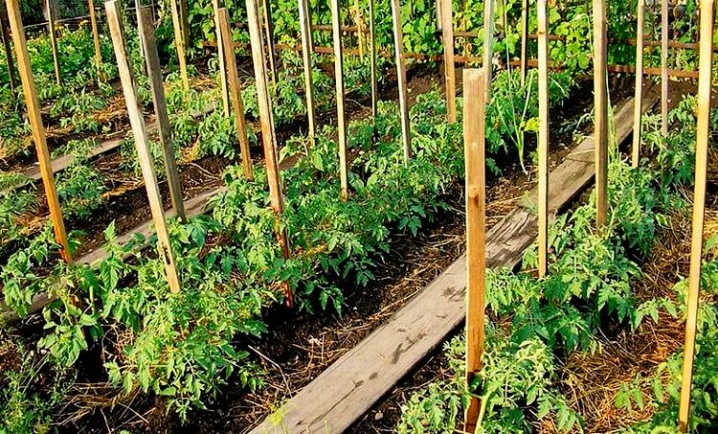
- Garter with caps. This will require wire and vine. The bottom line is that from these objects you need to build something like a pyramid. This design will be able to cover several plants at once. But it is only suitable for tall crops. The distance between the pyramids is at least 1 m.
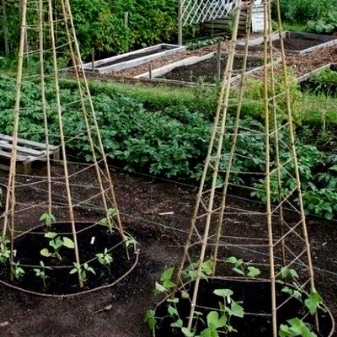
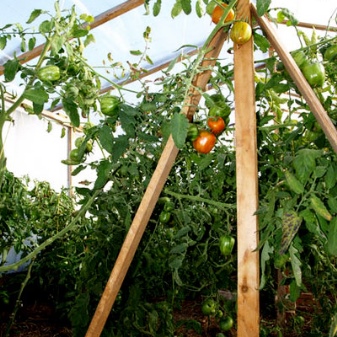
- Crochet garter. On both sides of the garden, sticks are installed for tying bushes. The rope is pulled, paying attention to all the plants. A wire is attached to it with thick wire S-hooks at different heights. A rubber ring is brought under the branch and put on a hook.
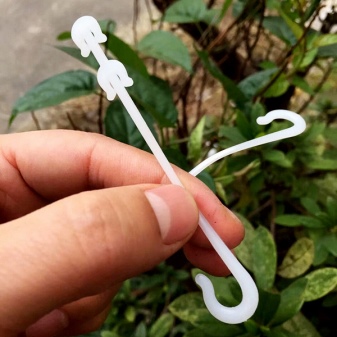
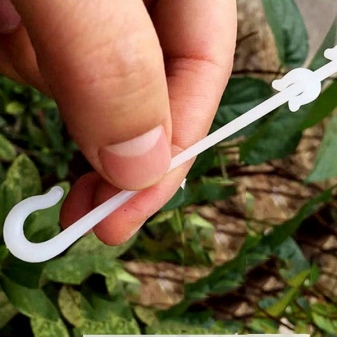
- Tying on trellises. It is only used with a large number of plants. This will require a long pole and wire. It is necessary to drive a pole hard into the ground on the sides of the bushes and attach a wire between them, to which the tomatoes will be tied. This method can be used in different ways. For example, fasten the wire at a height of 2 m and tie the plant stems with long ropes, or simply fasten the wire in several rows.
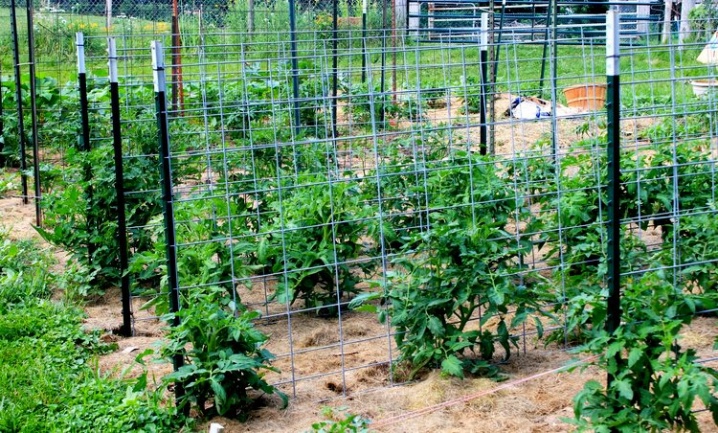
Many gardeners prefer to grow tomatoes in greenhouses. Plants can be tied up immediately after cutting off the stepchildren and the formation of a fruit ovary.
Most gardeners use the tomato trellis garter, as it is more practical and ideal for tall bushes.
For support, pipes made of metal or plastic are taken, inserted into the soil and covered with sand for greater stability. With the help of special fasteners, horizontal components of an elastic and soft cord (at different heights) are fixed on them.
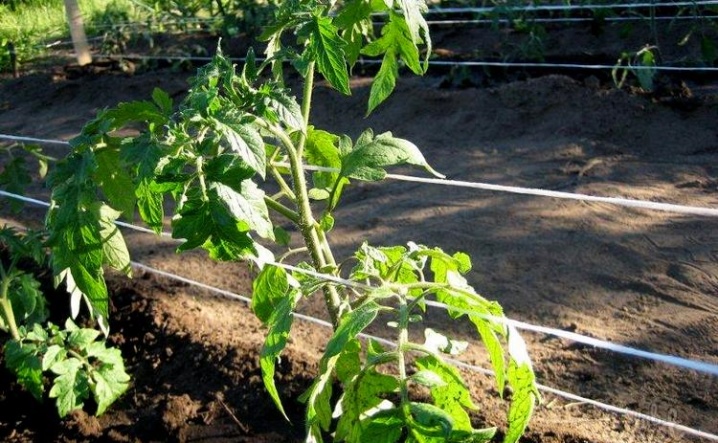
Other garter options are also suitable for the greenhouse.
- Capital construction. It can last for several years, and you do not need to attach additional materials to it. It is suitable not only for tomatoes, but also for cucumbers, large eggplants and other tall plants. But this can get quite expensive.
- Temporary mobile mount. Suitable for those gardeners who like to often change places for planting vegetable crops. This mount is well suited for trial cultivation.
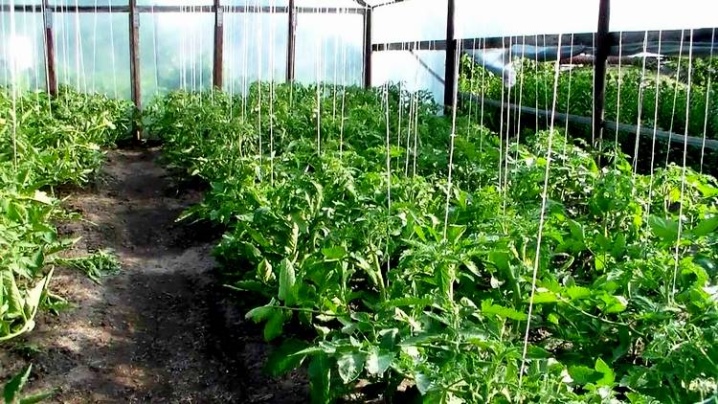
How to tie up tomatoes correctly?
The future harvest and the general condition of the bushes depend on whether the garter of tomatoes is correctly performed. It should be borne in mind that in the fresh air, tying with trellises in horizontal and vertical ways will be problematic. When fixing tomatoes in open ground, you need to choose a reliable design, since strong winds can knock down the support and plants. To get a good harvest, it is important to choose the tying method depending on the plant growth and fruit size.
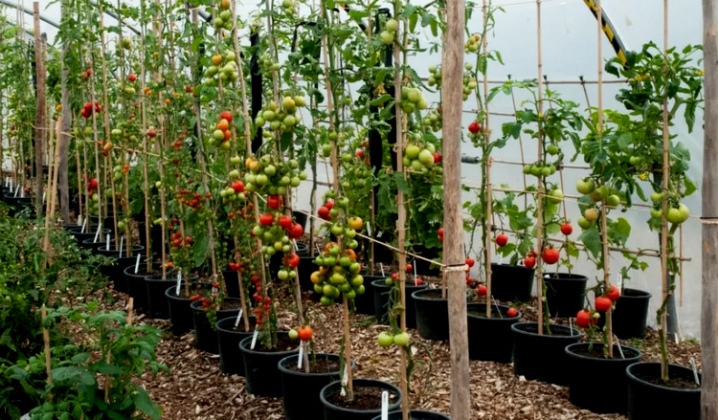
The simplest method of tying tomatoes, which is easy to build on the garden, is to use pegs. They can be any: wood, plastic, metal, boards, planks, tree branches (it is advisable to choose thicker branches). When installing the pegs, it is important to consider that the height of the support and the height of the bush must be equal. For medium-sized plants - even slightly higher (15-20 cm). The peg should be placed at least 10 cm from the plant to avoid damage to the root system.
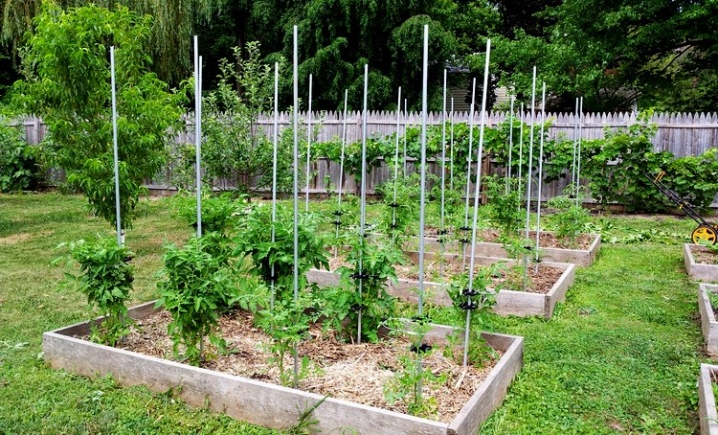
Next, you need to wrap the rope several times around the bush and tie it. It is important to take into account that the loops of the tie must be loosely tightened. Tight threads will only harm the plant and fruit. The following garters need to be done when the bush grows up. The frequency of the garters depends on the size of the bush. The faster it grows, the more often you will have to tie it up.
Having studied in this article why you need to tie up tomatoes, instructions and types of garters, every novice gardener will be able to determine the most comfortable way for him and his plants. Over time, you can try each, and eventually stop at one of them.
For more information about trellis for tomatoes, see the video below.


































































The comment was sent successfully.